Egyptian and Indonesian Governments Exchange Best Practices for Evidence-Based Policymaking
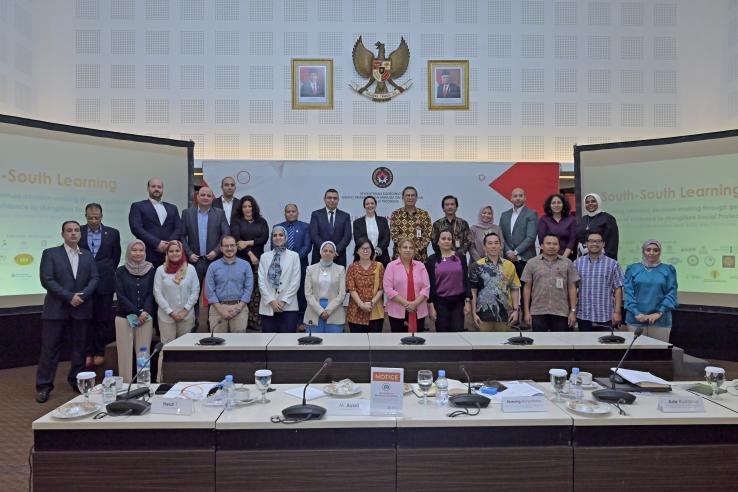
Jakarta, Indonesia— A high-level Egyptian delegation of 15 representatives from various government entities participated in a learning exchange visit in Jakarta, Indonesia from 27-31 May 2024. The learning exchange was organized by the Egypt Impact Lab (EIL), with the aim of strengthening the knowledge ecosystem in Egypt through partnerships and sharing best practices in integrating evidence into social protection program design and implementation.
Launched in 2022 as a collaboration between the Abdul Latif Jameel Poverty Action Lab Middle East and North Africa (J-PAL MENA) at the American University of Cairo (AUC) and the Ministry of Planning and Economic Development (MPED) based at the National Institute of Governance and Sustainable Development (NIGSD), with support from Community Jameel and the Sawiris Foundation for Social Development, the EIL works to strengthen Egypt’s poverty reduction policies by rigorously evaluating government programs and using results to inform scale decisions.
This learning exchange was supported by the Islamic Development Bank (IsDB) and Community Jameel and organized in collaboration with J-PAL MENA and J-PAL Southeast Asia (J-PAL SEA), based at the Faculty of Economics and Business of Universitas Indonesia (LPEM FEB UI).
The week-long trip featured a series of visits and meetings with key Indonesian ministries and agencies, including BAPPENAS (Ministry of National Development Planning), TNP2K (National Team for the Acceleration of Poverty Reduction) at the Secretariat of the Vice President, Kemenko PMK (Coordinating Ministry for Human Development and Cultural Affairs), and Kemensos (Ministry of Social Affairs).
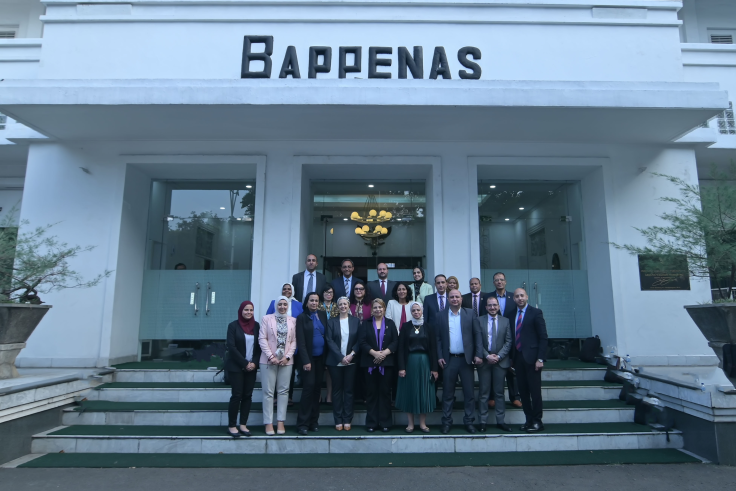
Discussions centered on leveraging evidence to inform policy formulation, strategies for scaling successful social protection initiatives, and collaborative approaches to poverty reduction. Site visits and workshops additionally provided an immersive learning experience.
“This South-South learning exchange presents a unique opportunity to learn from the successes and experiences of our Indonesian counterparts,” said Dr. Reham Rizk, Director of the EIL. “We look forward to sharing insights from Egypt’s national flagship programs while gaining valuable knowledge to enhance the design and implementation of evidence-based social protection policies in Egypt.”
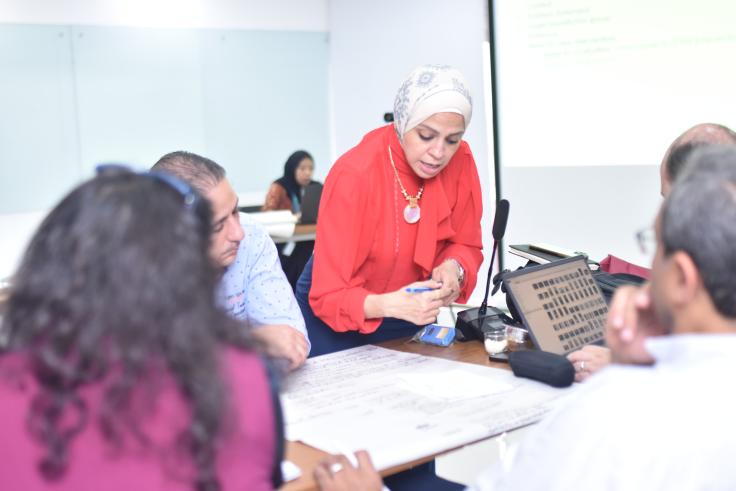
The Egyptian Government delegation was formally welcomed by Maliki, the Deputy Minister of National Development Planning for Population and Employment, BAPPENAS.
Maliki remarked that the visit opens up strategic opportunities for further cooperation between countries working to overcome poverty. “We hope this exchange of experiences can serve as a starting point for collaborative efforts among middle-income countries to improve societal welfare in a data-driven, inclusive, and adaptive manner, ensuring equal opportunities and comprehensive protection. BAPPENAS, as the leading institution in policy planning for poverty reduction, population, community empowerment, and national social protection, remains committed to cross-border learning. With the support of quality research, we aim to achieve our shared goals.”
Lina Marliani, Executive Director of J-PAL SEA at LPEM FEB UI, stated that this collaborative learning will demonstrate the collaboration amongst the participating countries’ longstanding policymakers and researchers. She added, “Indonesian government delegates will draw on the country’s well-established partnership with researchers to integrate evidence into decision-making, exemplified by the introduction of the nationwide ‘Social Protection Cards’ to enhance transparency in the Raskin (Rice for the Poor) program and the shift from in-kind food assistance to electronic voucher distribution called Bantuan Pangan Non-Tunai (BPNT).“
Suprayoga Hadi, Deputy for Policy Support of Human Development and Equal Development of the Secretariat of the Vice President of the Republic of Indonesia, positively welcomed the involvement of researchers to include evidence in decision making on poverty reduction. "Pentahelix collaboration can maximize efforts to reduce poverty in Indonesia," explained Suprayoga Hadi.
The Head of Policy Team of the TNP2K of the Vice Presidential Secretariat, Elan Satriawan, added, "Data integration is one of the keys to poverty alleviation. It can prevent exclusion errors or poor and vulnerable families who have not received assistance programs from the government."
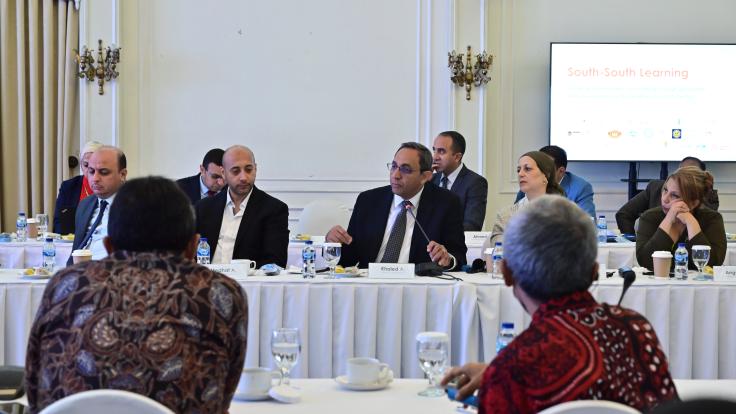
Dr. Sherifa Sherif, Executive Director of NIGSD, said, “As we are committed to monitoring and enhancing Egypt's standing in regional governance, competitiveness, and sustainable development metrics, and as the host of EIL, we were delighted to witness the formal integration of the EIL in our structure. This in turn has a strong signaling effect on recognizing the invaluable role it plays in advancing evidence-based policies and enhancing our nation's development efforts.”
Uzma Sulaiman, Associate Director of Community Jameel, said: “We are pleased to be working with J-PAL and the Egyptian and Indonesian governments to build on the successes of the EIL. Through this initiative, we hope to create a scalable model that can foster learning between the two governments and promote stronger and more informed policies.”
May Ali Babiker, Director, Cooperation and Capacity Development Department, IsDB, noted, “At the Bank, we believe in the importance of mainstreaming a culture of evidence-based policymaking to strengthen the effectiveness of national development policies in our member countries. Thus, the Bank has agreed to join hands with Community Jameel to support this learning exchange and foster long term collaboration between Indonesia and Egypt in evidence-based policymaking.
Speaking on behalf of J-PAL MENA at AUC, Executive Director Dr. Ahmed Elsayed emphasized, “By facilitating cross-country exchanges between policymakers, practitioners, and researchers, we aim to build a culture of evidence utilization. This collaborative learning effort will contribute to developing more effective and equitable social protection programs.”
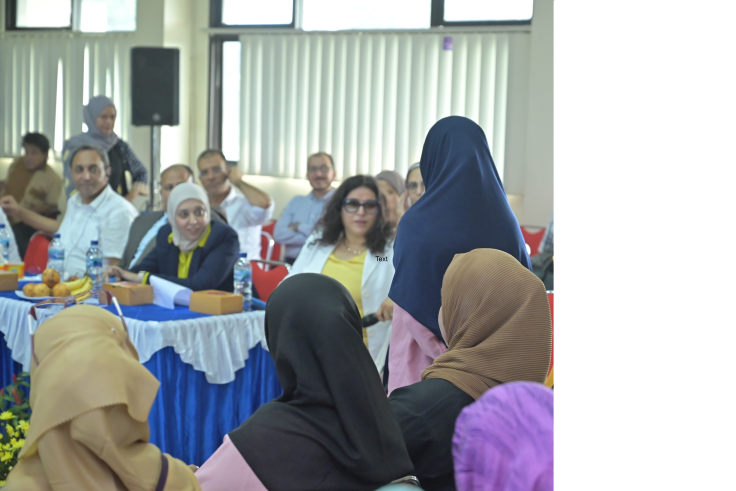
This knowledge-sharing journey will culminate with action plans from Egyptian delegates, outlining strategies to enhance collaboration between the EIL and government stakeholders for developing new impact evaluations addressing key challenges in social protection. Continued efforts include organizing “Leading for Evidence-Informed Decision-Making (LEID)” events to foster an environment conducive to evidence generation and utilization in Egypt.
Learn more about the Egypt Impact Lab.
###
About BAPPENAS
The Ministry of National Development Planning/Bappenas is a technocratic body that undertakes a pivotal role in Indonesia's development by executing Planning, Allocation, Control, and Enabler functions. Bappenas formulates macroeconomic strategies, coordinates policy implementation, and updates Indonesia’s national development plan that decides the country’s development strategies forward. Their role may also encompass allocating funds to strategic sectors and developing public investment models. Bappenas also evaluates development outcomes, spearheads coordination among government organizations, and offers assistance and capacity building to enhance their effectiveness. Additionally, Bappenas fosters innovation, strengthens partnerships, and formulates visionary policies.
About J-PAL MENA at AUC
The Abdul Latif Jameel Poverty Action Lab Middle East and North Africa (J-PAL MENA) at The American University in Cairo’s School of Business is a regional office established in July 2020, as a part of a larger network of research centers worldwide working to reduce poverty by ensuring that policy is informed by scientific evidence. Anchored by a network of more than 260 affiliated professors at universities around the world, J-PAL MENA draws on results from randomized impact evaluations to answer critical questions in the fight against poverty. We build partnerships with governments, NGOs, donors, and others to share this knowledge, scale up effective programs, and advance evidence-informed decision-making. Learn more about J-PAL MENA.
About the American University in Cairo School of Business
Boasting an unrivaled reputation as the top private business school in Egypt and one of the best in Africa and the Arab world, AUC School of Business is dedicated to transforming the eager and innovative minds of today to become the responsible change agents of tomorrow, all while developing relevance and leadership in an evolving ecosystem.
Situated within AUC and enjoying nearly seven decades’ worth of history, the School offers a wide range of programs and activities that extend beyond the classroom to provide a holistic and engaging experiential learning approach. The School’s seal of excellence is the Triple Crown accreditation, which places it among the top 1 percent of educational institutions worldwide to achieve the Association to Advance Collegiate Schools of Business, the Association of MBAs and the European Quality Improvement System accreditations. For more information, visit business.aucegypt.edu/.
About MPED
The Ministry plays the leading role in achieving sustainable development & formulating impact based policies via effective planning, monitoring & evaluation of government performance to implement the sustainable development agenda besides efficient management of public investments towards a knowledge-based and competitive economy in partnership with the private sector & civil society through attracting & raising the capabilities of distinguished human assets using a scientific methodology in line with global best practices. Ministry of Planning and Economic Development aims to develop sustainable development plans and achieve consistency between the implementation of the strategic vision of the state and development plans in various areas. The Ministry is also developing a guide to educate citizens about the objectives and policies of the development plan, with the aim of highlighting priority areas. The Ministry also works on the development and implementation of (Egypt Vision 2030) in coordination with ministries, stakeholders and development partners, which helps to develop the statistical capabilities to measure the impact, performance and project completion rates to achieve the objectives of the vision.
About IsDB Group
Rated AAA by the major rating agencies of the world, the Islamic Development Bank is the premier multilateral development bank of the Global South that has been working for over 50 years to improve the lives of the communities it serves by bringing about change and impact at scale. IsDB brings together 57-Member Countries across four continents, touching the lives of nearly 1 out of 5 of the world population while addressing development challenges and promoting collaboration to achieve the UN SDGs. Its mission is to equip and empower people towards driving their own economic and social progress, putting the infrastructure in place and enabling them to fulfil their potential. Headquartered in Jeddah, Kingdom of Saudi Arabia, IsDB has evolved from a single entity into a Group comprising six entities: Islamic Development Bank (IsDB), the Islamic Development Bank Institute (IsDBI) tasked with research and training, the Islamic Corporation for the Insurance of Investment and Export Credit (ICIEC), the Islamic Corporation for the Development of the Private Sector (ICD), the International Islamic Trade Finance Corporation (ITFC), as well as the Islamic Solidarity Fund for Development (ISFD) which is IsDB’s arm for poverty alleviation. For more information, please visit www.isdb.org.
- Find updates on LinkedIn: https://www.linkedin.com/company/islamic-development-bank/
- Visit us on X: @isdb_group
- Engage with us on Facebook: https://www.facebook.com/isdbgroup
About Community Jameel
Community Jameel advances science and learning for communities to thrive. An independent, global organisation, Community Jameel was launched in 2003 to continue the tradition of philanthropy and community service established by the Jameel family of Saudi Arabia in 1945. Community Jameel supports scientists, humanitarians, technologists and creatives to understand and address pressing human challenges in areas such as climate change, health and education.
The work enabled and supported by Community Jameel has led to significant breakthroughs and achievements, including the MIT Jameel Clinic’s discovery of the new antibiotics halicin and abaucin, critical modelling of the spread of COVID-19 conducted by the Jameel Institute at Imperial College London, and a Nobel Prize-winning experimental approach to alleviating global poverty championed by the co-founders of the Abdul Latif Jameel Poverty Action Lab at MIT. Learn more at communityjameel.org.
About J-PAL Southeast Asia
J-PAL Southeast Asia, based at the University of Indonesia, leads J-PAL’s work in the Southeast Asia region. J-PAL Southeast Asia conducts randomized evaluations, builds partnerships for evidence-informed policymaking, and helps partners scale up effective programs.
J-PAL SEA’s work spans a wide range of sectors, including social welfare, migration, health, good governance, and financial inclusion. This includes conducting capacity-building activities for policymakers, researchers, and academics seeking to learn and apply rigorous impact evaluation, and work with central and local governments to help build a culture of evidence-informed decision-making in the region. Learn more about J-PAL Southeast Asia.